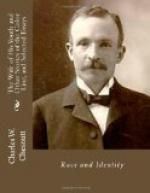The next witness was the constable who had gone with a warrant to search Ben’s shop. He testified to the circumstances under which the whip was found.
“He wuz brazen as a mule at fust, an’ wanted ter git mad about it. But when we begun ter turn over that pile er truck in the cawner, he kinder begun ter trimble; when the whip-handle stuck out, his eyes commenced ter grow big, an’ when we hauled the whip out he turned pale ez ashes, an’ begun to swear he did n’ take the whip an’ did n’ know how it got thar.”
“You may cross-examine,” said the prosecuting attorney triumphantly.
The prisoner felt the weight of the testimony, and glanced furtively at the jury, and then appealingly at his lawyer.
“You say that Ben denied that he had stolen the whip,” said the prisoner’s attorney, on cross-examination. “Did it not occur to you that what you took for brazen impudence might have been but the evidence of conscious innocence?”
The witness grinned incredulously, revealing thereby a few blackened fragments of teeth.
“I ’ve tuck up more ‘n a hundred niggers fer stealin’, Kurnel, an’ I never seed one yit that did n’ ’ny it ter the las’.”
“Answer my question. Might not the witness’s indignation have been a manifestation of conscious innocence? Yes or no?”
“Yes, it mought, an’ the moon mought fall—but it don’t.”
Further cross-examination did not weaken the witness’s testimony, which was very damaging, and every one in the court room felt instinctively that a strong defense would be required to break down the State’s case.
“The State rests,” said the prosecuting attorney, with a ring in his voice which spoke of certain victory.
There was a temporary lull in the proceedings, during which a bailiff passed a pitcher of water and a glass along the line of jury-men. The defense was then begun.
The law in its wisdom did not permit the defendant to testify in his own behalf. There were no witnesses to the facts, but several were called to testify to Ben’s good character. The colored witnesses made him out possessed of all the virtues. One or two white men testified that they had never known anything against his reputation for honesty.
The defendant rested his case, and the State called its witnesses in rebuttal. They were entirely on the point of character. One testified that he had heard the prisoner say that, if the negroes had their rights, they would own at least half the property. Another testified that he had heard the defendant say that the negroes spent too much money on churches, and that they cared a good deal more for God than God had ever seemed to care for them.
Ben Davis listened to this testimony with half-open mouth and staring eyes. Now and then he would lean forward and speak perhaps a word, when his attorney would shake a warning finger at him, and he would fall back helplessly, as if abandoning himself to fate; but for a moment only, when he would resume his puzzled look.




